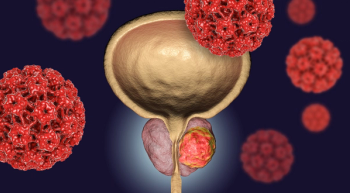
Treatment with neoadjuvant tislelizumab plus platinum-based doublet chemotherapy, followed by surgery and adjuvant tislelizumab, improved event-free survival in patients with resectable non–small cell lung cancer.

Kristi Rosa joined MJH Life Sciences in 2016 and has since held several positions within the company. Prior to working at the company, she served as lead copywriter and marketing coordinator at The Strand Theater. Email: krosa@onclive.com

Treatment with neoadjuvant tislelizumab plus platinum-based doublet chemotherapy, followed by surgery and adjuvant tislelizumab, improved event-free survival in patients with resectable non–small cell lung cancer.

Patients with relapsed/refractory chronic lymphocytic leukemia or small lymphocytic lymphoma treated with lisocabtagene maraleucel experienced durable responses.

Fast track designation has been granted by the FDA to vepdegestrant for the treatment of select patients with ER-positive/HER2-negative locally advanced or metastatic breast cancer.

Patients with advanced gastric cancer treated with second-line fruquintinib/paclitaxel experienced significant improvements in progression-free survival but not overall survival when compared with paclitaxel alone.

The FDA granted efineptakin alfa an orphan drug designation, deeming it a potential treatment option for pancreatic cancer.

An sNDA seeking approval for alectinib received priority review from the FDA, which, if approved, will be indicated to treat patients with early-stage ALK-positive NSCLC after surgery.

Patients with cisplatin-ineligible urothelial carcinoma treated with frontline pembrolizumab plus cabozantinib obtained responses with a manageable toxicity profile.

Patients with resectable gastric and GEJ cancers, regardless of region, experienced an improved pathologic complete response to treatment with durvalumab plus neoadjuvant FLOT compared with chemotherapy alone.

A breakthrough therapy designation has been granted by the FDA to TAR-200 for the treatment of Bacillus Calmette-Guérin–unresponsive, high-risk non–muscle invasive bladder cancer who are not eligible for or opted not to receive radical cystectomy.

SLS009 has been granted fast track status from the FDA to be considered as a potential therapeutic option for relapsed or refractory acute myeloid leukemia.

Findings from the phase 3b LUMINANCE study aligned with safety and efficacy outcomes from the phase 3 CASPIAN trial, both of which focused on the administration of 5 or more cycles of induction platinum/etoposide alongside durvalumab for the treatment of patients with extensive-stage small cell lung cancer.

A supplemental biologics license application has been granted priority review by the FDA, which seeks a full approval of tisotumab vedotin for patients with recurrent or metastatic cervical cancer that progressed on or following frontline therapy.

When compared with palbociclib and fulvestrant, adding inavolisib to the regimen improved progression-free survival in some patients with PIK3CA-mutated, hormone receptor–positive, HER2-negative, locally advanced or metastatic breast cancer.

The FDA has granted priority review to mirvetuximab soravtansine for folate receptor α (FRα)–positive, platinum-resistant epithelial ovarian, fallopian tube, or primary peritoneal cancer.

A priority review of nivolumab plus cisplatin-based chemotherapy as a frontline treatment option for adult patients with unresectable or metastatic urothelial carcinoma is underway.

The use of pirtobrutinib following covalent Bruton tyrosine kinase inhibitor therapy may be an important sequencing approach in chronic lymphocytic leukemia/small lymphocytic lymphoma, according to recent research.

Different subsets of patients with estrogen receptor-positive breast cancer achieved better pathologic complete response rates with neoadjuvant pembrolizumab/chemotherapy vs placebo/chemotherapy.

Frontline cadonilimab (AK104) and platinum-based chemotherapy improved progression-free survival in patients with recurrent or metastatic cervical cancer.

The median overall survival was 77.5 months with frontline pembrolizumab vs 36.7 months with chemotherapy in patients with microsatellite instability–high or mismatch repair–deficient metastatic colorectal cancer.

The FDA has approved nirogacestat as a treatment for adults with progressing desmoid tumors based off findings from the phase 3 DeFi trial.

Manufacturers have announced that they will be withdrawing the new drug application for copanlisib in adult patients with relapsed follicular lymphoma.

Repotrectinib is now available to treat adults with advanced or metastatic non-small cell lung cancer that harbors a ROS1 fusion.

Lisocabtagene maraleucel is under consideration as a potential treatment option for patients with chronic lymphocytic leukemia or small lymphocytic lymphoma.

The median OS achieved with atezolizumab plus bevacizumab and chemotherapy was 32.1 months vs 22.8 months with bevacizumab and chemotherapy alone.

In the intention-to-treat population, the median progression-free survival was 24.8 months with selpercatinib vs 11.2 months.

The FDA has approved entrectinib to treat pediatric patients ages 1 month and older with NTRK-positive solid tumors.

The FDA has approved pembrolizumab with platinum-containing chemotherapy for patients with resectable non–small cell lung cancer, in both the neoadjuvant and adjuvant setting.

Takeda has announced that they will be voluntarily withdrawing mobocertinib for patients with EGFR exon 20 insertion mutation-positive non–small cell lung cancer.

The FDA Oncologic Drugs Advisory Committee voted 10-to-2 that findings from the phase 3 CodeBreaK 200 trial cannot be reliably interpreted.

The benmelstobart combination reduced the risk of death by 39% vs placebo plus chemotherapy in patients with extensive-stage small cell lung cancer.